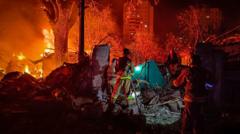In a groundbreaking case, Dmitriy Kurashov is being held accountable for his alleged involvement in war crimes, reflecting Ukraine's commitment to humane justice amidst ongoing conflict.
**Historic Trial: Russian Soldier Faces Justice for Alleged Battlefield Execution in Ukraine**

**Historic Trial: Russian Soldier Faces Justice for Alleged Battlefield Execution in Ukraine**
A Russian soldier becomes the first to stand trial in Ukraine for accusations of executing a captured opponent.
In the bleak environment of Zaporizhzhia, history is being made as Dmitriy Kurashov, a Russian soldier known by the callsign 'Stalker', stands trial, marking the first instance of a Russian soldier facing charges in Ukraine for alleged war crimes. This unprecedented trial highlights accusations surrounding battlefield executions, particularly concerning the death of Ukrainian soldier Vitalii Hodniuk, known as 'Penguin'.
The allegations stem from an operation that took place in early January 2024, corresponding with a dismal winter on the frontline. Amidst ice and conflict, Kurashov's unit conducted its first assault, resulting in tragedy on both sides. Ukrainian officials allege that Kurashov shot Hodniuk after the soldier attempted to surrender, a stark violation of military law and humanity’s ethical standards. According to reports, Kurashov initially declared himself not guilty but later switched his plea to guilty in the hopes of expediting the proceedings.
The trial not only represents a legal pursuit of justice but is also a reflection of the ongoing concerns regarding battlefield conduct among Russian forces. UN reports have cited an alarming rise in executions by Russian troops, with evidence suggesting that Kurashov's actions were not isolated incidents. In fact, Ukrainian authorities are currently investigating a multitude of war crimes, significantly emphasizing the need for accountability.
An essential part of the prosecution’s case involves witness testimonies from three members of Kurashov's own unit, further illustrating the grim atmosphere surrounding this conflict. The witness accounts are part of a robust body of evidence developed by Ukrainian security agencies, involving meticulous investigative work despite the challenging conditions on the battlefield.
As Kurashov remains in a glass-enclosed dock throughout the proceedings, the stakes loom high. If convicted, he could face a life sentence, transitioning from being a prisoner of war to a convicted criminal under Ukraine's law. In a landscape rife with complexities, the judicial process goes beyond individual culpability, hinting at wider implications for military conduct and command structures within the ongoing war.
The trial is unfolding in a local court, challenging the legalities and protocol surrounding war crimes as Ukraine faces a daunting task of administering justice amidst the unrest. Analogous to the enduring struggles of soldiers like Hodniuk, whose story may echo through history, the consequences of this trial could impact the future of military accountability on both sides of the conflict.
As the case progresses, it exemplifies a pivotal moment that seeks to establish and uphold the principles of justice, even amid the shadows cast by war. The trial not only highlights the tragic urgency for accountability but also illuminates the harsh realities faced by soldiers caught in this relentless combat. The outcome might offer significant precedents within the scope of international law application regarding war crimes, holding those responsible accountable, thus amplifying the voices of victims like Vitalii Hodniuk whose ultimate sacrifice reminds humanity of the heavy toll of warfare.
The allegations stem from an operation that took place in early January 2024, corresponding with a dismal winter on the frontline. Amidst ice and conflict, Kurashov's unit conducted its first assault, resulting in tragedy on both sides. Ukrainian officials allege that Kurashov shot Hodniuk after the soldier attempted to surrender, a stark violation of military law and humanity’s ethical standards. According to reports, Kurashov initially declared himself not guilty but later switched his plea to guilty in the hopes of expediting the proceedings.
The trial not only represents a legal pursuit of justice but is also a reflection of the ongoing concerns regarding battlefield conduct among Russian forces. UN reports have cited an alarming rise in executions by Russian troops, with evidence suggesting that Kurashov's actions were not isolated incidents. In fact, Ukrainian authorities are currently investigating a multitude of war crimes, significantly emphasizing the need for accountability.
An essential part of the prosecution’s case involves witness testimonies from three members of Kurashov's own unit, further illustrating the grim atmosphere surrounding this conflict. The witness accounts are part of a robust body of evidence developed by Ukrainian security agencies, involving meticulous investigative work despite the challenging conditions on the battlefield.
As Kurashov remains in a glass-enclosed dock throughout the proceedings, the stakes loom high. If convicted, he could face a life sentence, transitioning from being a prisoner of war to a convicted criminal under Ukraine's law. In a landscape rife with complexities, the judicial process goes beyond individual culpability, hinting at wider implications for military conduct and command structures within the ongoing war.
The trial is unfolding in a local court, challenging the legalities and protocol surrounding war crimes as Ukraine faces a daunting task of administering justice amidst the unrest. Analogous to the enduring struggles of soldiers like Hodniuk, whose story may echo through history, the consequences of this trial could impact the future of military accountability on both sides of the conflict.
As the case progresses, it exemplifies a pivotal moment that seeks to establish and uphold the principles of justice, even amid the shadows cast by war. The trial not only highlights the tragic urgency for accountability but also illuminates the harsh realities faced by soldiers caught in this relentless combat. The outcome might offer significant precedents within the scope of international law application regarding war crimes, holding those responsible accountable, thus amplifying the voices of victims like Vitalii Hodniuk whose ultimate sacrifice reminds humanity of the heavy toll of warfare.


















